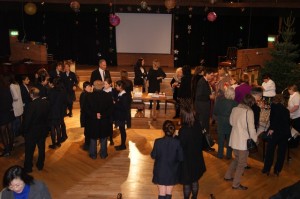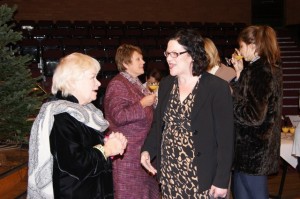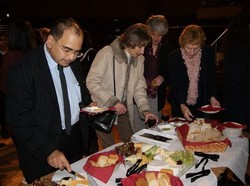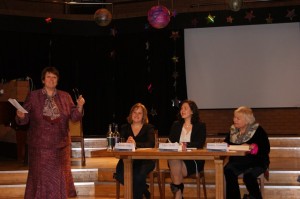‘In Business’ Event a Great Success December 2011
Current and former pupils, parents and staff formed were held fascinated by the speakers at the ‘Withington In Business’ event held in Withington’s Arts Centre on Thursday 1st December.
At the event, which was jointly hosted by Withington’s Careers Department and the Development Office, School welcomed two Alumnae guest speakers, Sandra Chalmers (1958 Year Leaver) and Belinda Carp (née Salem, 1985 Year Leaver) who spoke informally about their careers as businesswomen and the positive effect their Withington education has had on their professional lives.
After guests were welcomed to School by Headmistress Mrs Sue Marks, Sandra Chalmers addressed those gathered in the Arts Centre, including several fellow 1958 leavers, and spoke fondly of her time at Withington and the life-long effect her time at the School has had on her career. Sandra is Director of Chalmers Communications, her communications consultancy which is based in London, and has previously held roles as Editor of the award-winning BBC ‘Woman’s Hour’, Head of BBC Radio Press, PR & Promotions and Director of Communications for worldwide charity Help the Aged.
Sandra recalled her last visit to School in 1982, when she and her sister Judith opened the Marjorie Hulme Arts Centre, and noted how lovely it was to walk in and be greeted by her classmates. As “proud old girls” of Withington, both Sandra and Judith (who left Withington in 1954) have gone on to forge successful careers in broadcasting and the media, and recognise that the education they received at the School has stayed with them throughout their lives.
Sandra spent a “full, informative, active and challenging 11 years” at WGS, where she was deeply involved in all aspects of school life. She recalled a School which held Science and the Arts in equal esteem, headed by Miss Bain, who Sandra described as a “real tough cookie”, and where you were never allowed to do anything ‘partly’. The newly built Simon laboratories meant Withington was known as a ‘fine science School’; whilst Joyce Boucher’s leadership in the English department led to a strong dramatic tradition – Sandra and her sister Judith both appeared in her now legendary production of ‘Murder in the Cathedral’. Sandra commented that when she arrived at Withington that afternoon, she sensed the same spirit of camaraderie amongst today’s pupils which existed when she was a student; and recalled that, as it does now, Withington’s pupils and staff always looked beyond the School’s walls to support the local community.
Sandra told guests that the work ethic she learnt at Withington has stayed with her throughout her life, and that she has, she hopes, passed this on to her colleagues and children. A strong work ethic was not the only lesson to have stayed with Sandra: she recalled Miss Proust’s teaching on apostrophes in the Junior School, which she has subsequently passed on to many colleagues during her working life.
A broadcaster for almost 60 years, Sandra’s first experience of the profession was in appearances on the radio whilst still a pupil at Withington, and she continued broadcasting throughout her degree at the University of Manchester. After graduation, she went to work for the BBC, where she spent almost 30 years in a variety of roles, including launching the first ever radio phone-in programme for BBC Radio Manchester; leading on a collaboration between BBC Radio 4 and the World Service on the first ever international radio phone-in; and editing the award-winning ‘Woman’s Hour’ programme on Radio 4, where she initiated the programme’s first ever outside broadcasts.
Sandra’s passion for radio, and its ability to reach a wide audience, was apparent to all those gathered, and she continued to broadcast regularly for Saga Radio during the 2000s. She advised those gathered to always consider their audience when communicating, and spoke of how saddened she has felt by the Leveson Inquiry into the privacy and the media, recalling how she was taught at the outset of her career of the importance of honesty and fairness, and the need to show balance in all reporting.
After leaving ‘Woman’s Hour’, Sandra went on to become Head of Press and PR for BBC Radio, before moving on to Help the Aged, where she spent six years as the charity’s Director of Communications. Then, in 2000, aged 60 and feeling “hemmed in” by being an employee, she started her own business, Chalmers Communications, where she has spent 11 years consulting and providing media training for clients including Ofcom, the NHS and the Stroke Association. Her company was borne of direct requests for help from those who recognised her huge experience in her field, and Sandra credits her ability to train others to the “enthusiastic and involved teaching” acquired at Withington.
To conclude, Sandra advised those thinking of starting a business thus: “You need a sense of purpose, and confidence in your own experience and that what you have to offer would be valuable to others. You need energy and good health, and practical support from an understanding family to enable you to dedicate time and energy to the business. You need the will and means to stay current, as things change very quickly; and you need a sense of challenge, even fear – it’s good to be scared on a regular basis. You need a courteous disposition, as aggression rarely brings good relations; and must be good at spotting great talent and new opportunities, and developing both. Make sure to have associates whose skills complement one another, to search for simplicity and to always keep your eye on the ball.”
After Sandra’s final words of advice, Belinda Carp, Director of Sales, Marketing and Business Development at Textiles Intelligence and a member of the Board of Directors for the International Apparel Federation, then took to the stage and spoke about her career spent in small family businesses and the varying challenges of her current role.
Belinda joined Withington at the age of 7, commencing her studies in Mrs Morton’s Form I class, and left in 1983 after completing her O Level’s to work at her family’s business, which manufactured and sold waterproof jackets and horse rugs, where she worked, on and off, for nearly ten years. Belinda recalled spending days at a time travelling around the racehorse training centres such as Newmarket and Upper Lambourn, meeting famous trainers such as Jenny Pitman, the first woman to train a Grand National winner, which did so wearing a rug made by Belinda’s family company. Belinda’s experiences during those ten years would stand her in good stead for her current role with Textiles Intelligence years later.
After working part time whilst her daughters were small, in 1997 Belinda applied for a role at a small specialist publishing company based just a couple of streets away from her home in Wilmslow, Textiles Intelligence, which commissions reports and sell subscriptions to companies involved in the textile industry, providing them with the statistics needed to plan their manufacturing and sales strategies. Belinda explained Textiles Intelligence’s niche market thus: “at the top end of the scale, you might have a huge chemical company which is producing raw materials which will end up in polyester clothing. That chemical company needs to know where to find customers to sell to, and its customers are the companies that produce textile fabrics. In turn, the clothing manufacturers buy the textile fabrics to turn them into clothing. All of this happens on a global scale, and there are lots of factors which affect international trade.”


Belinda described how Textiles Intelligence produces its reports, and the specific challenges the Editorial Team faces when producing reports for customers, many of whom are not based in the UK. She then went on to discuss her responsibilities as Sales Director, and how contrary to popular opinion, her role involves mostly listening, rather than talking! Belinda’s enjoyment of her role and the personal contact with her customers that it affords her was evident to all, as was her pride in the company’s excellent reputation for customer service. Social media, especially LinkedIn, has meant that Belinda is able to connect with others in her industry easily, identify contacts whom she might not otherwise have met and advertise Textiles Intelligence’s products to their very specific audience.
The global nature of the company’s business means that Belinda often meets her customers at conferences and exhibitions held around the world. Belinda is also responsible for Business Development at Textiles Intelligence, and she explained how the tough financial climate has meant that the company has had to keep looking at emerging markets in which they can grow their business, which has led to more travel recently in China and India. She is responsible for the company’s business plan and updates it regularly to ensure that everyone working for the organisation is aware of its goals, and how they are responsible for helping to deliver them.
Belinda then shared her thoughts on child labour, an issue which affects her industry particularly but which is not as clear-cut as it may first appear. She explained how she had interviewed the Chief Operating Officer of the clothing designer Tommy Hilfiger a few years ago, who had explained that they will only deal with suppliers who treat their workers fairly. Whilst in some cases this means that children are employed, their employment is conditional upon Tommy Hilfiger building schools for the children concerned, limiting the number of hours that the children can work, and supplying necessary healthcare to communities. Belinda explained that, as a consumer society, individuals must consider where the items they purchase are made, and asked, “When we go shopping for cut-price bargains, who do you think is really paying the price for these bargains?”
Belinda concluded by explaining how, if she had been asked when at School to write down all the things she would want her career to include, her job at Textiles Intelligence would tick every box. She advised those thinking of a career in business to connect with as many people as possible and to take an interest in them, as “people do business with people”; and to always be aware of the “opportunities for business that are all around us.”.
After thanking Belinda and Sandra, Withington’s Development Director Clare Flynn then invited questions for the two speakers from the audience. When asked how to start a business, Sandra advised that the best way was often to start with one or two people who are looking for the product or service you provide, and then build things from there, and Belinda concurred, noting that many people start a business whilst still in employment, and wait until it gathers pace before ‘giving up the day job’.
Headmistress Mrs Sue Marks then asked if things were still difficult for women in business. Belinda commented that she feels sexism is often a generational problem, but that it is not always men who don’t take women seriously; whilst Sandra noted the enormous changes that have been wrought on this issue during her career, and how thrilled she is that the workplace is now more equal.
 When asked what the most important skills needed as a business owner, Sandra explained that Belinda had summed it up perfectly in her presentation: “always learn and always listen”, whilst Belinda explained that integrity is crucial in business, as often, ‘who cares wins’: companies that have effective CSR strategies are those that are successful, as in the age of social media, there is nowhere to hide. Sandra concurred, noting how crucial crisis management is for any company; and then went on to explain that in broadcasting, “those whose ears and eyes are open to things that interest them and that can spark the interest of others” will always find success.
When asked what the most important skills needed as a business owner, Sandra explained that Belinda had summed it up perfectly in her presentation: “always learn and always listen”, whilst Belinda explained that integrity is crucial in business, as often, ‘who cares wins’: companies that have effective CSR strategies are those that are successful, as in the age of social media, there is nowhere to hide. Sandra concurred, noting how crucial crisis management is for any company; and then went on to explain that in broadcasting, “those whose ears and eyes are open to things that interest them and that can spark the interest of others” will always find success.
In response to another question, Sandra concluded that her WGS education had given her an appetite for learning, and that she had enjoyed the demands placed on pupils at the school as it set her up with a work ethic which has remained with her ever since; whilst Belinda commented that her time at Withington had taught her the importance of striving for perfection, as well as, as Sandra had already mentioned, where to correctly place an apostrophe in a sentence!
The final question came from one of the current pupils in the audience, who asked whether success in business is solely due to luck and circumstance, or whether integrity and hard work are a guarantee of success. Both speakers were in agreement that success is never guaranteed, but that energy, enthusiasm and hard work combined with luck mean that anything can be achieved, and advised those present to “keep an open mind, keep [their] eyes open and react to the world around [them]”. Clare Flynn and Sue Marks then both thanked the speakers once again, before guests enjoyed further discussion of the issues raised over cheese and wine.
Everyone at School is most grateful to Sandra and Belinda for speaking at the event, and we are now looking forward to future ‘Withington In’ careers-focussed events in 2012.



